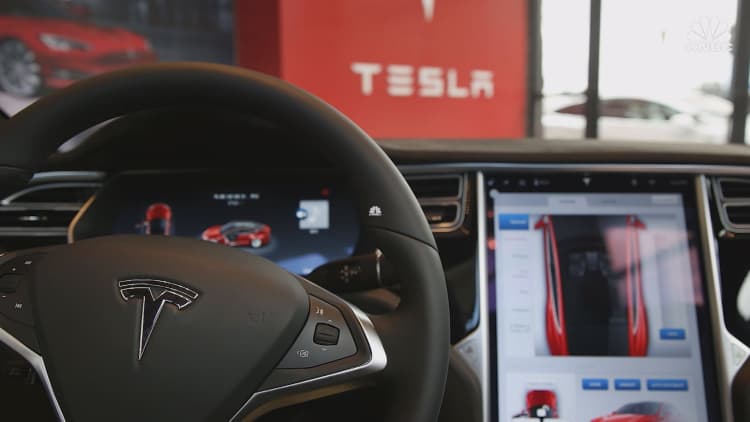
Elon Musk's tweet that he is considering taking Tesla private has ignited a firestorm of speculation about how he could pull off such a deal.
A leveraged buyout, as CNBC's Leslie Picker points out, seems infeasible since Tesla does not generate the cash flow necessary to pay out the debt.
That leaves a take-private structure that primarily involves equity. The amount of money needed seems daunting. Some 170 million shares times $420 amounts to $71.4 billion. It would be the largest take-private transaction in history.
But maybe he doesn't need to raise all that money. Maybe he just needs to get existing shareholders to believe in his vision, and drag in a few others.
At least one minority stakeholder appears to be ruling itself out. Reuters reported on Saturday that Saudi Arabia's Public Investment Fund (PIF) has shown no interest so far in financing a deal, despite acquiring a minority stake in the company this year.
However, the good news is Musk himself controls 20 percent of the stock. Let's look at the top five shareholders:
Tesla's largest shareholders
Elon Musk 20 percent
T. Rowe Price 9.1 percent
Fidelity 8.2 percent
Baillie Gifford 7.7 percent
Tencent 4.9 percent
Source: FactSet
After Musk, the four other largest shareholders own about 30 percent of the stock. That means Musk and the top four own 50 percent of Tesla.
One Tesla investor, Saudi Arabia's Public If these four could be persuaded to stay in some kind of special-purpose entity, the goal is already a long way toward being met.
Now, instead of raising $71 billion, he might need to raise only half of that, say, $35 billion or so.
That's the thinking of Morningstar's David Whiston. In a recent note to investors, he speculated that "funding comes mostly from tech investors, such as possibly SoftBank or Tencent (the latter bought 5 percent of Tesla in 2017), sovereign wealth funds, and wealthy Silicon Valley investors."
The good news, Whiston told CNBC last week, is that these kinds of strategic investors already exist.
"The tech industry loves Elon," Whiston said. "I'd be surprised if SoftBank wanted nothing to do with the deal, and I'd be surprised if Tencent wasn't interested in buying more."
Evercore ISI's George Galliers sees the same scenario, with equity from a combination of a strategic investor acquiring a 15 percent to 20 percent stake, two to three private investment firms or sovereign wealth funds acquiring up to 10 percent stakes, and finally certain larger members of the existing shareholder base or some form of fund for smaller accredited investors making up the rest.
Bringing in strategic investors, private investment firms and sovereign wealth funds would greatly expand the pool of potential investors.
How about a sovereign wealth fund? The reporting that Saudi Arabia's Public Investment Fund has invested roughly 3 percent ($2 billion) gives credence to this possibility. The dollar amount is less than 1 percent of the value of the Saudi PIF, and there would be plenty of room for other sovereign wealth funds to invest.
Sovereign Wealth Funds
(assets under management, in billions)
Norway Govt. Pension $1,035
China Invest. Corp $941
Abu Dhabi $683
Kuwait $592
Singapore (Temasek) $375
Saudi Arabia PIF $250
Source: Sovereign Wealth Fund Institute
And then there are small investors. Whiston noted that roughly 12 percent of the shareholders are individuals, "and they love Elon too. A lot of them are going to be interested in staying with him." Of course, it's likely that any special purpose entity created from existing shareholders would require the investors to be accredited.
There are other obvious issues that would have to be surmounted. Creditors would have to allow existing debt to roll over. And the issue of foreign investors raises questions about how far the Trump administration would be willing to go to allow even small ownership of a high-tech firm by the Chinese, the Saudis or anyone else.
But those are issues for another day. The important point is the one made Wednesday on CNBC by Vivek Wadhwa, a distinguished fellow at Carnegie Mellon and Harvard Law.
"There's a lot of money in the world," he said. Like many, Wadwha believes that Musk is the Einstein and Edison of our age and believes that a lot of other investors believe that and are willing to go on a very long ride with him. "This thing could be worth far, far more if left alone from the short sellers," he told CNBC.
--Reuters contributed to this article.


